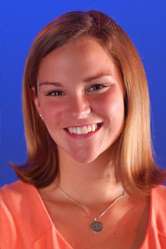Dance and Interdisciplinary Studies
“Arts Advocacy: How to inspire policy change by measuring and communicating the benefits of dance lessons on children.”

The benefits of dance programs within a regularly structured education system are only beginning to be documented, but previous research suggests that there is a correlation between children who take dance lessons and development of confidence, creativity in problem solving, focus, perseverance, dedication, and social skills. My research aims to build upon existing literature on the benefits of dance lessons through my own experiences teaching dance to the children enrolled in the Summer Learning Program at Easton Elementary School in partner with the local YMCA. With the help of YMCA Camp Counselors, I will measure the levels of focus, motivation, and happiness of my students over the course of the program. This project seeks to record these benefits, so that in an increasingly scientific world, the influence of the Arts in education may remain significant.
How did you know this was the project you wanted to do?
I have always wanted to combine my passion for the Arts with my purpose to advance the Arts in education through policy. With the creation of my Interdisciplinary Studies Major titled “Arts Advocacy”, I knew that I wanted to do research that would help me grow as an advocate. I also love to teach dance, so I knew this project would be a lot of fun!
Is this your first independent research/artistic project?
This is my first independent research project of this type, but I previously received the Linehan Summer Research and Study Award to study dance for three weeks with Doug Varone and Dancers in New York.
Do you get course credit for this work?
Yes! This research will also be presented as my Interdisciplinary Studies Capstone.
How did you hear about the Undergraduate Research Award (URA) program?
I had attended URCAD several times and many of my friends had done research through the URA. After seeing their projects and learning about their experiences, I wanted to do it, too!
What academic background did you have before you applied for the URA?
I was a Junior when I applied to the URA, so I had completed most of my core and degree requirements. One of the classes that has helped me the most in completing the analytical portion of this research was POLI 301- Political Science Research Methods with Dr. Carolyn Forestiere. She became my URA mentor and has been infinitely helpful in designing, implementing, and completing this research.
Was the application difficult to do?
The application was easier than I thought it would be. I found it really helpful to attend the workshops provided, and would recommend working closely with your mentor while completing the application.
What has been the hardest part about your research?
The hardest part of my research was definitely coordinating with all the necessary people to implement my dance program within the Summer Learning Program. I began planning with the local YMCA in December, but by May they had gotten so busy that it was hard to schedule meetings about my research. I had to be persistent while also trying not to be bothersome, as I understood they had a lot they were trying to plan.
What was the most unexpected thing?
I thought that the children I worked with would like dancing, but I didn’t expect that on the last day they would all want to know where to take dance lessons and wanted to know if I would be coming back next summer! They were a little bit resistant at the beginning, so I wasn’t expecting that sort of reaction to the dance program in the end. It was unexpected, but I was so happy!
How does your research relate to your work in other classes?
Because I am an Interdisciplinary Studies Major, I designed my coursework to eventually lead up to this research project. I took classes in research, dance, sociology, political science, and social work that all related to my project in some way.
What else are you involved in on campus?
I am a Linehan Artist Scholar, the President of Dance Council of Majors, and have been a Welcome Week Leader for the past three years.
What is your advice to other students about getting involved in research?
Don’t be afraid to ask for help!!! Everyone I have worked with on this project has been more than happy to help me and I am really grateful for that. It is easy to think that because you designed the project you shouldn’t ask for help, but that is not the case!
What are your career goals?
While I know that I want to be an advocate for the arts, I do not exactly know how I want to do this. In the Spring, I will be interning with Americans for the Arts working on arts education governmental affairs. I’m really looking forward to this experience helping me shape my career goals.
Did you transfer to UMBC from another institution? Where?
I started at UMBC as a freshman and will be graduating next May!
Mary is a double major in Dance and Interdisciplinary Studies, and is also pursuing an Accelerated BA/Master’s in Public Policy at UMBC. Last summer, she volunteered to teach dance to a group of 20 children enrolled in a Summer Learning Program in Easton, MD. Through this program, she measured the benefits of dance lessons and is communicating the policy implications of such benefits through her research project.
12/09/2013